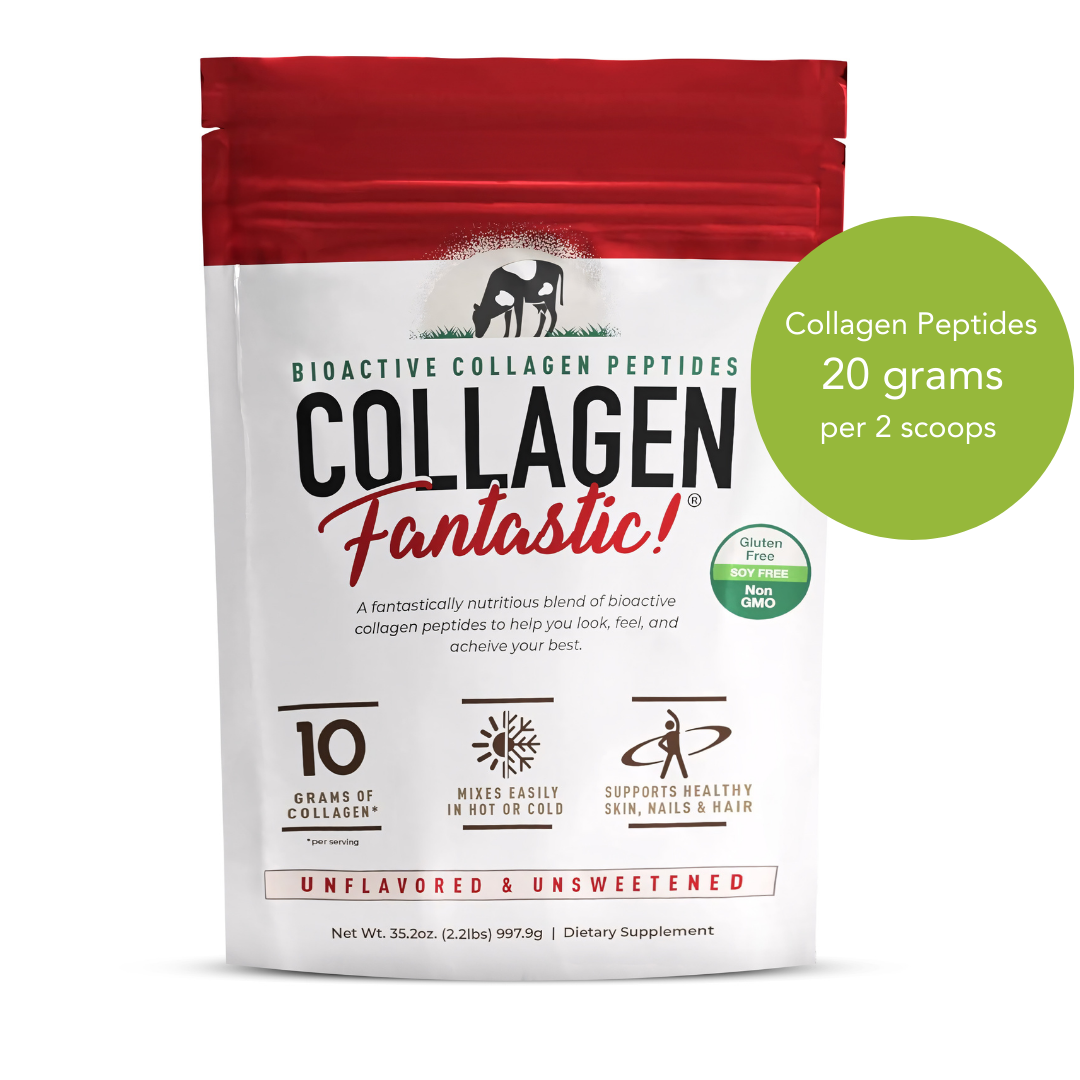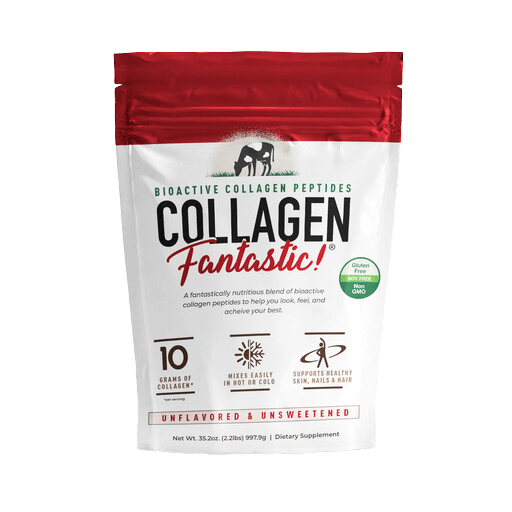Key Takeaways
-
Many active adults underestimate how much protein they actually need—especially after age 35, when absorption efficiency declines.
-
Low protein intake can show up as fatigue, muscle loss, brittle hair and nails, or extended soreness after workouts.
-
Protein supports far more than muscle; it’s vital for hormones, immune strength, and energy production.
-
Most adults benefit from 0.7–1.0 grams of protein per pound of body weight per day, spaced evenly across meals.
-
Supplementing with high-quality whey or collagen protein can help close nutritional gaps without relying on excess food volume.
Introduction: The Protein Paradox
You exercise regularly, choose healthy meals, and maybe even blend a smoothie after your workouts. It seems impossible that you could be low on protein.
Yet, many health-minded adults quietly fall short. As we age, our bodies become less efficient at digesting and using protein, while our needs for it actually increase. That mismatch often leads to fatigue, slow recovery, and gradual muscle loss—symptoms we blame on “getting older” but that are often signs of insufficient protein intake.
Below are five subtle but important ways your body tells you it needs more protein, along with practical strategies to correct each one.
1. You’re Losing Muscle, Not Just Fat
If you notice that your workouts feel harder, your limbs look softer, or your strength numbers have stalled, it may not be your training—it could be your protein intake.
Why It Happens
Muscle is dynamic tissue that constantly breaks down and rebuilds. Without enough dietary protein to drive that rebuilding process, your body starts converting existing muscle to meet essential needs. The result is muscle loss, slower metabolism, and a physique that feels less defined.
This is particularly common for adults over 40 due to sarcopenia, an age-related loss of muscle mass accelerated by low protein intake and insufficient resistance training.
How to Fix It
-
Eat protein consistently: Rather than saving it all for dinner, include 25–35 grams at each meal.
-
Recover strategically: Within one hour of exercise, aim for 20–30 grams of a fast-digesting whey protein shake.
-
Set a daily target: A general range of 0.7–1.0 grams of protein per pound of body weight supports both maintenance and growth.
Pro Tip: Whey protein sourced from grass-fed cows ([link to whey protein product page]) is rapidly absorbed and rich in leucine, a key amino acid that triggers muscle repair.
2. You’re Always Hungry (Even After Meals)
If you often feel unsatisfied shortly after eating, the problem might not be portion size but protein balance.
Why It Happens
Protein is the macronutrient most responsible for regulating the hormones that control hunger and fullness—specifically ghrelin and leptin. Meals high in carbohydrates and low in protein can cause blood-sugar fluctuations that leave you feeling hungry again soon after eating.
How to Fix It
-
Add protein to every meal:
-
Breakfast: eggs, Greek yogurt, or a protein shake
-
Lunch: chicken, lentils, or salmon
-
Dinner: lean beef, tofu, or fish
-
-
Reimagine snacks: Replace empty-calorie snacks with nutrient-dense ones like jerky, cottage cheese, or a small shake.
-
Slow down: Give your body time to recognize satiety—protein helps, but eating too fast masks the signal.
Pro Tip: Blend Fantastic Nutrition Whey Protein with oats or fruit for a mid-afternoon snack that stabilizes blood sugar and satisfies cravings.
3. You’re Sore for Days After Workouts
Post-workout soreness is normal; persistent soreness is not. If recovery takes longer than usual, your body might be missing the raw materials it needs to rebuild muscle fibers.
Why It Happens
Exercise creates micro-tears in muscle tissue. During recovery, your body uses amino acids to repair and strengthen those fibers. Without enough protein, that repair process stalls, leaving you achy and fatigued for days.
Signs You’re Under-Recovering
-
Soreness lasting beyond 72 hours
-
Ongoing fatigue or weakness
-
Declining performance
-
Restless sleep due to muscle discomfort
How to Fix It
-
Fuel recovery: Consume 20–30 grams of protein within an hour after training. Whey protein is ideal because of its rapid digestion and high leucine content.
-
Support connective tissue: Collagen peptides ([link to collagen peptides page]) strengthen tendons and ligaments, which are slower to recover than muscle.
-
Prioritize rest: Even with perfect nutrition, poor sleep can undermine protein synthesis.
Pro Tip: Combining whey for muscle tissue and collagen for joint health covers the full spectrum of recovery needs.
4. Your Hair, Skin, and Nails Are Weaker Than They Used to Be
Hair thinning, brittle nails, or dry skin can all point to a lack of available protein in your diet.
Why It Happens
Your body allocates nutrients based on survival. When protein is limited, it prioritizes vital organs over cosmetic structures like hair and nails. In addition, collagen production decreases with age, reducing the integrity of connective tissue and skin elasticity.
How to Fix It
-
Diversify your protein sources: Mix animal and plant proteins for a broader amino acid profile.
-
Supplement collagen: Ten to twenty grams of collagen peptides daily can restore skin elasticity and strengthen hair and nails.
-
Include vitamin C: Collagen synthesis requires vitamin C; pair your supplement with citrus, berries, or leafy greens.
Pro Tip: Fantastic Nutrition Collagen Peptides ([link to collagen product page]) dissolve easily in hot or cold beverages and provide a simple way to maintain skin and joint health.
5. You Feel Tired, Moody, or Unfocused
Low protein intake doesn’t just impact muscles; it affects your brain chemistry and overall energy.
Why It Happens
Protein provides the amino acids your brain uses to produce neurotransmitters like dopamine and serotonin. Without adequate intake, you may experience fatigue, brain fog, irritability, or difficulty concentrating.
How to Fix It
-
Start strong: Begin your day with a protein-rich breakfast to stabilize energy and mood.
-
Balance macronutrients: Combine protein with complex carbohydrates and healthy fats to avoid mid-day crashes.
-
Maintain consistency: Steady intake throughout the day ensures continuous support for cognitive function.
Pro Tip: When energy dips in the afternoon, a small whey shake offers a smoother boost than another cup of coffee.
Why Protein Needs Increase After 40
Aging reduces the body’s sensitivity to protein intake—a phenomenon called anabolic resistance. Simply put, your muscles require more amino acids to trigger the same level of repair they once achieved with smaller doses.
A person in their 20s might need about 20 grams of protein per meal for optimal synthesis, whereas someone in their 50s may need 30–40 grams. Combine that with decreased appetite and slower digestion, and protein shortfalls become common even among active adults.
The solution is consistency and quality: evenly distributed, high-protein meals supported by strategic supplementation.
Frequently Asked Questions
1. How can I tell if I’m getting enough protein without tracking?
Notice your recovery, hunger, and energy. If you feel constantly sore, snacky, or fatigued, you may be under-eating protein. Aim for a palm-sized portion of protein at every meal as a simple visual guide.
2. Can I get enough protein from plants alone?
Yes, but it takes careful planning. Combine multiple plant sources—like beans with rice or lentils with seeds—to ensure all essential amino acids are covered. If you follow a vegetarian or vegan diet, consider adding a plant-based protein powder.
3. Should I take protein on rest days?
Absolutely. Muscle repair and growth happen during rest, not just training. Consistent daily intake keeps your body in a positive protein balance even when you’re not exercising.
4. Is it okay to use protein shakes every day?
Yes. Protein shakes are a convenient way to meet your targets. They’re best used to supplement, not replace, whole food meals. Look for products without artificial additives, like Fantastic Nutrition Whey Protein ([link to whey protein product page]).
The Bottom Line
If you’re training hard, eating well, but still feeling tired or seeing slow results, your body may simply need more protein. Spread it evenly across meals, use quality supplements to fill the gaps, and pay attention to how you feel.
Protein is more than a fitness nutrient—it’s the foundation of energy, recovery, and longevity.
Ready to Simplify Your Protein Routine?
Support your health goals with Fantastic Nutrition Whey Protein and Collagen Peptides—clean, grass-fed, and formulated for real-life performance.












